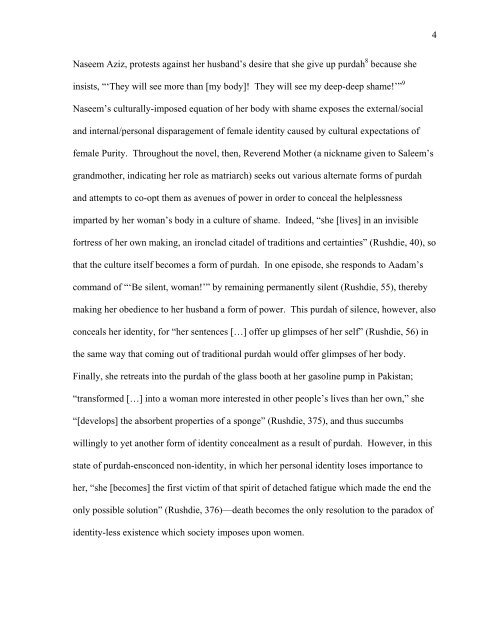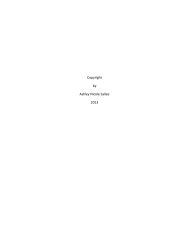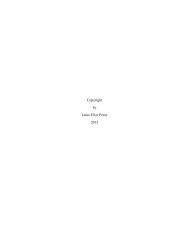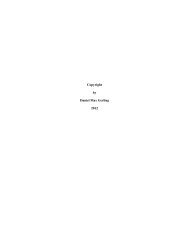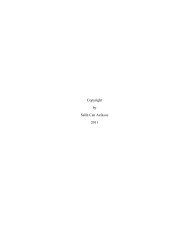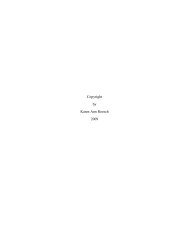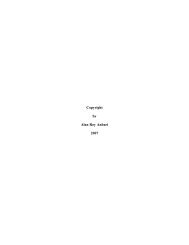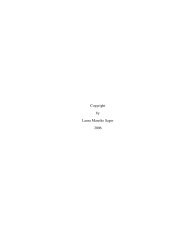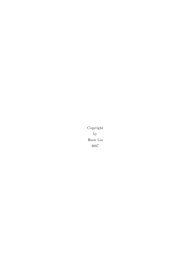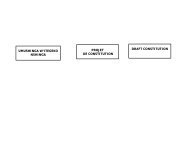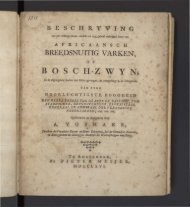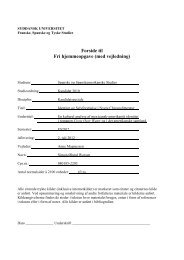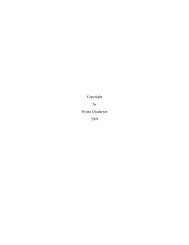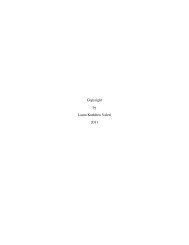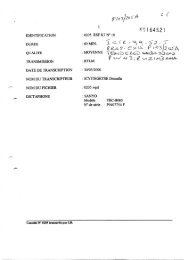The Secret Society: Descendants of Crypto-Jews in the San Antonio ...
The Secret Society: Descendants of Crypto-Jews in the San Antonio ...
The Secret Society: Descendants of Crypto-Jews in the San Antonio ...
Create successful ePaper yourself
Turn your PDF publications into a flip-book with our unique Google optimized e-Paper software.
4<br />
Naseem Aziz, protests aga<strong>in</strong>st her husband’s desire that she give up purdah 8 because she<br />
<strong>in</strong>sists, “‘<strong>The</strong>y will see more than [my body]! <strong>The</strong>y will see my deep-deep shame!’” 9<br />
Naseem’s culturally-imposed equation <strong>of</strong> her body with shame exposes <strong>the</strong> external/social<br />
and <strong>in</strong>ternal/personal disparagement <strong>of</strong> female identity caused by cultural expectations <strong>of</strong><br />
female Purity. Throughout <strong>the</strong> novel, <strong>the</strong>n, Reverend Mo<strong>the</strong>r (a nickname given to Saleem’s<br />
grandmo<strong>the</strong>r, <strong>in</strong>dicat<strong>in</strong>g her role as matriarch) seeks out various alternate forms <strong>of</strong> purdah<br />
and attempts to co-opt <strong>the</strong>m as avenues <strong>of</strong> power <strong>in</strong> order to conceal <strong>the</strong> helplessness<br />
imparted by her woman’s body <strong>in</strong> a culture <strong>of</strong> shame. Indeed, “she [lives] <strong>in</strong> an <strong>in</strong>visible<br />
fortress <strong>of</strong> her own mak<strong>in</strong>g, an ironclad citadel <strong>of</strong> traditions and certa<strong>in</strong>ties” (Rushdie, 40), so<br />
that <strong>the</strong> culture itself becomes a form <strong>of</strong> purdah. In one episode, she responds to Aadam’s<br />
command <strong>of</strong> “‘Be silent, woman!’” by rema<strong>in</strong><strong>in</strong>g permanently silent (Rushdie, 55), <strong>the</strong>reby<br />
mak<strong>in</strong>g her obedience to her husband a form <strong>of</strong> power. This purdah <strong>of</strong> silence, however, also<br />
conceals her identity, for “her sentences […] <strong>of</strong>fer up glimpses <strong>of</strong> her self” (Rushdie, 56) <strong>in</strong><br />
<strong>the</strong> same way that com<strong>in</strong>g out <strong>of</strong> traditional purdah would <strong>of</strong>fer glimpses <strong>of</strong> her body.<br />
F<strong>in</strong>ally, she retreats <strong>in</strong>to <strong>the</strong> purdah <strong>of</strong> <strong>the</strong> glass booth at her gasol<strong>in</strong>e pump <strong>in</strong> Pakistan;<br />
“transformed […] <strong>in</strong>to a woman more <strong>in</strong>terested <strong>in</strong> o<strong>the</strong>r people’s lives than her own,” she<br />
“[develops] <strong>the</strong> absorbent properties <strong>of</strong> a sponge” (Rushdie, 375), and thus succumbs<br />
will<strong>in</strong>gly to yet ano<strong>the</strong>r form <strong>of</strong> identity concealment as a result <strong>of</strong> purdah. However, <strong>in</strong> this<br />
state <strong>of</strong> purdah-ensconced non-identity, <strong>in</strong> which her personal identity loses importance to<br />
her, “she [becomes] <strong>the</strong> first victim <strong>of</strong> that spirit <strong>of</strong> detached fatigue which made <strong>the</strong> end <strong>the</strong><br />
only possible solution” (Rushdie, 376)—death becomes <strong>the</strong> only resolution to <strong>the</strong> paradox <strong>of</strong><br />
identity-less existence which society imposes upon women.


